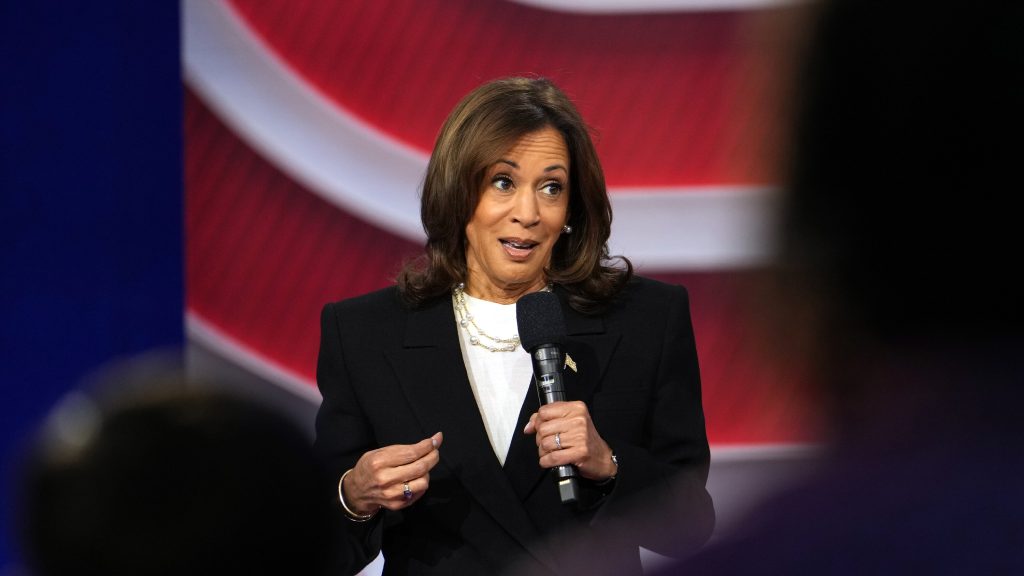Takeaways from Kamala Harris’ CNN town hall
3 min read
Vice President Kamala Harris participates in a CNN Presidential Town Hall moderated by CNN’s Anderson Cooper in Delaware County, Pennsylvania, on Wednesday, October 23.

Vice President Kamala Harris participates in a CNN Presidential Town Hall moderated by CNN’s Anderson Cooper in Delaware County, Pennsylvania, on Wednesday, October 23.
In a recent CNN town hall, Vice President Kamala Harris sharply criticized Donald Trump, labeling him “unstable” and “unfit to serve” as she sought to rally undecided voters in the closing weeks of the 2024 presidential campaign. Harris emphasized that Trump represents a threat to the nation’s core values, citing concerns raised by former military officials who served under him. She specifically noted their alarming descriptions of Trump, linking his rhetoric to fascism and his comments about the military targeting “enemies within.”
Harris warned, “If Trump wins, he’s going to sit there, unstable and unhinged, plotting his revenge,” articulating a vision of Trump as a divisive force rather than a traditional political opponent.
Here are some key takeaways from the event:
When asked if she views Trump as a fascist, Harris responded affirmatively, urging voters not to take her word alone but to consider the opinions of military leaders like Gen. Mark Milley and former White House chief of staff John Kelly. Her strategy aims to sway moderate Republicans and independents by framing Trump as a direct threat to democracy, focusing on his behavior rather than her policy positions.
Harris has been questioned about how her administration would differ from President Biden’s. While she often deflected, at the town hall, she confidently stated, “My administration will not be a continuation of the Biden administration.” She emphasized her unique ideas and experience, presenting herself as a leader of a new generation committed to tackling issues like Medicare coverage for home health care.

When pressed by CNN’s Anderson Cooper about her past assertiveness on these points, she offered little detail but reiterated that while significant progress had been made under Biden, more was necessary.
Harris faced scrutiny over border security amid rising illegal crossings. She defended the Biden administration’s approach, arguing for a bipartisan legislative solution rather than short-term executive actions. Contrasting her stance with Trump’s unfulfilled promises regarding the border wall, she stressed the need for comprehensive reform while asserting that she supports a secure border.
Navigating the sensitive topic of the Israel-Hamas war, Harris called for an end to hostilities while supporting Israel’s right to defend itself. She expressed hope that the death of Hamas leader Yahya Sinwar could facilitate a ceasefire and advance a two-state solution. Responding to audience concerns over U.S. funding of military aid to Israel, she recognized the humanitarian crisis in Gaza but maintained that the U.S. must remain engaged in international security matters.
Harris has actively sought support from anti-Trump Republicans, repeatedly mentioning endorsements from figures like Liz Cheney and Dick Cheney. This strategy aims to present her candidacy as a viable option for those dissatisfied with Trump’s leadership. She highlighted her willingness to collaborate with the private sector to address issues such as the housing crisis, aligning her messaging with traditional Republican values.
Harris faced questions regarding perceived shifts in her policy positions since becoming the nominee, particularly her past support for police funding reallocations and fracking. She clarified her stance against banning fracking, emphasizing the need for a balanced approach to environmental concerns. Additionally, she defended her commitment to border security and criticized any notion that she would support an open-border policy.
In summary, Harris’ town hall illustrated her focused effort to galvanize support among undecided voters, particularly moderate Republicans and independents, by positioning Trump as a significant threat to democratic values while advocating for a distinct, forward-looking leadership approach.